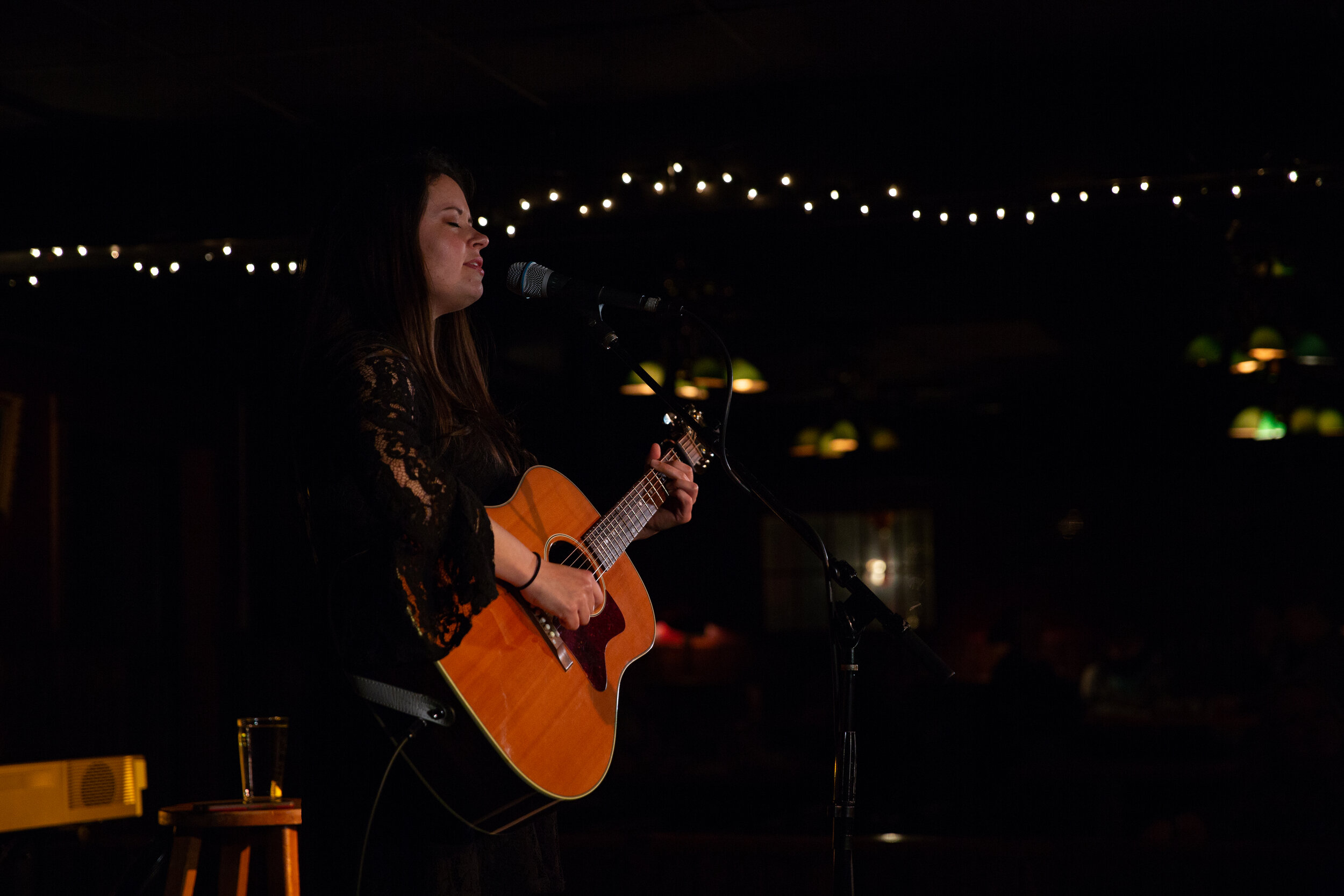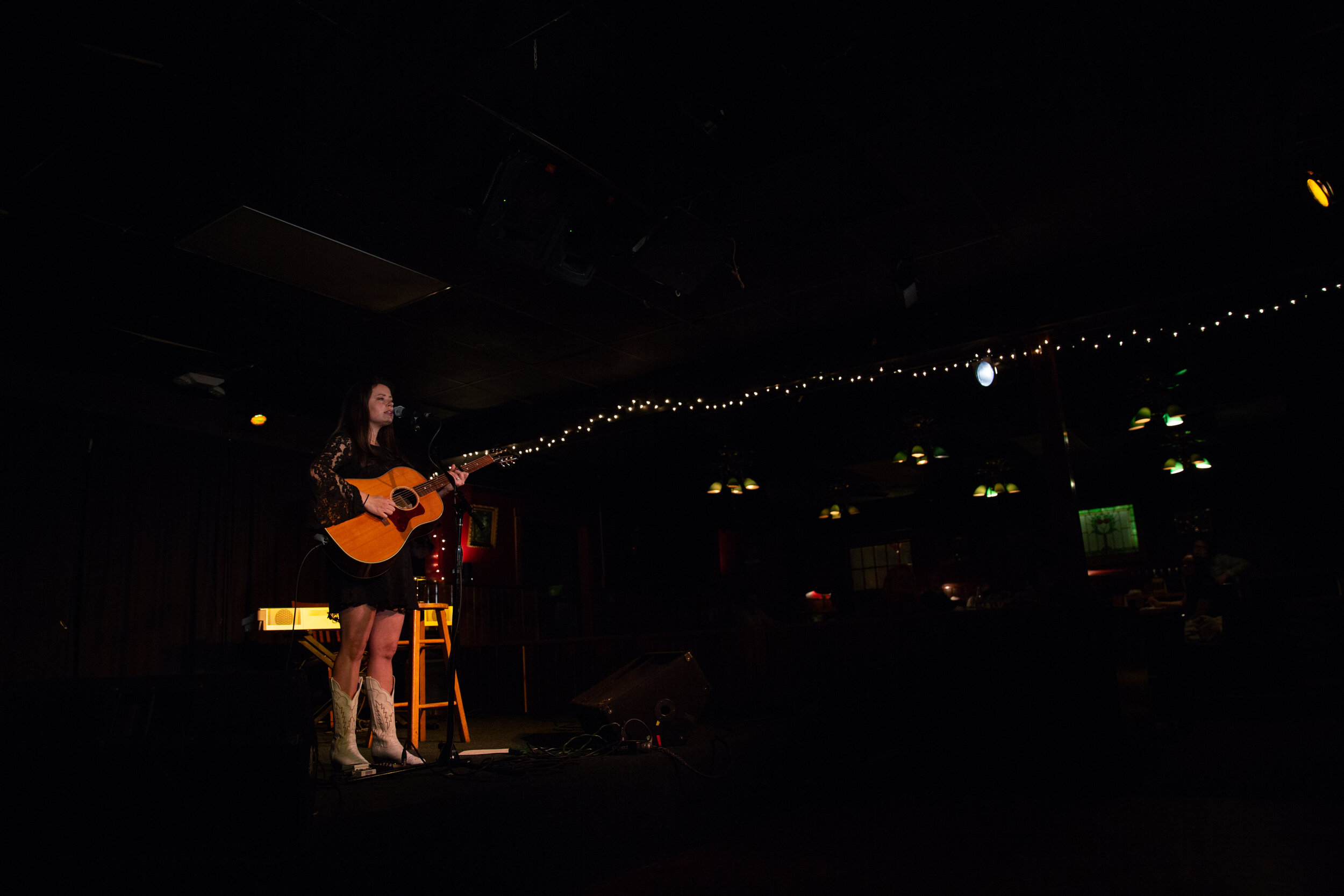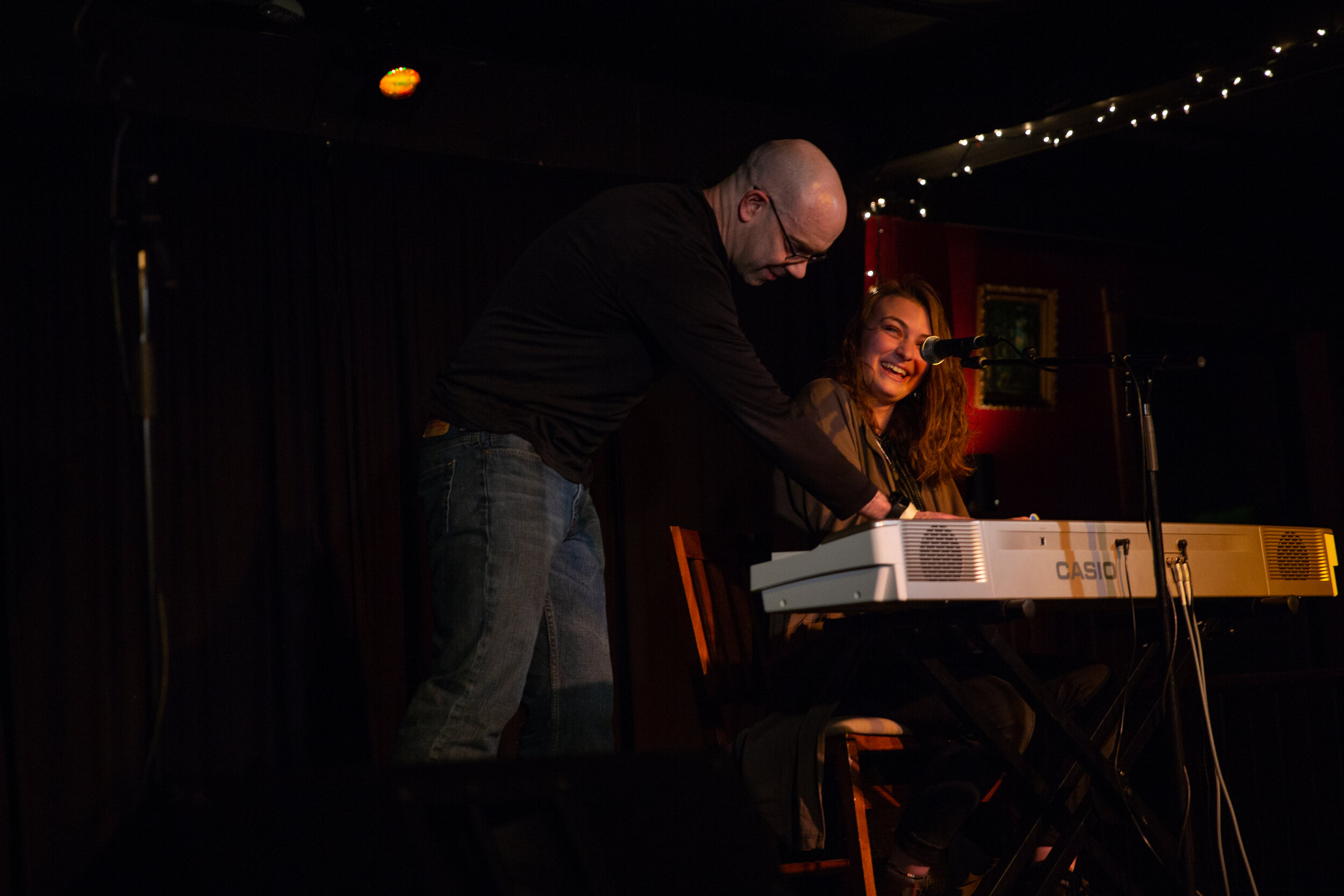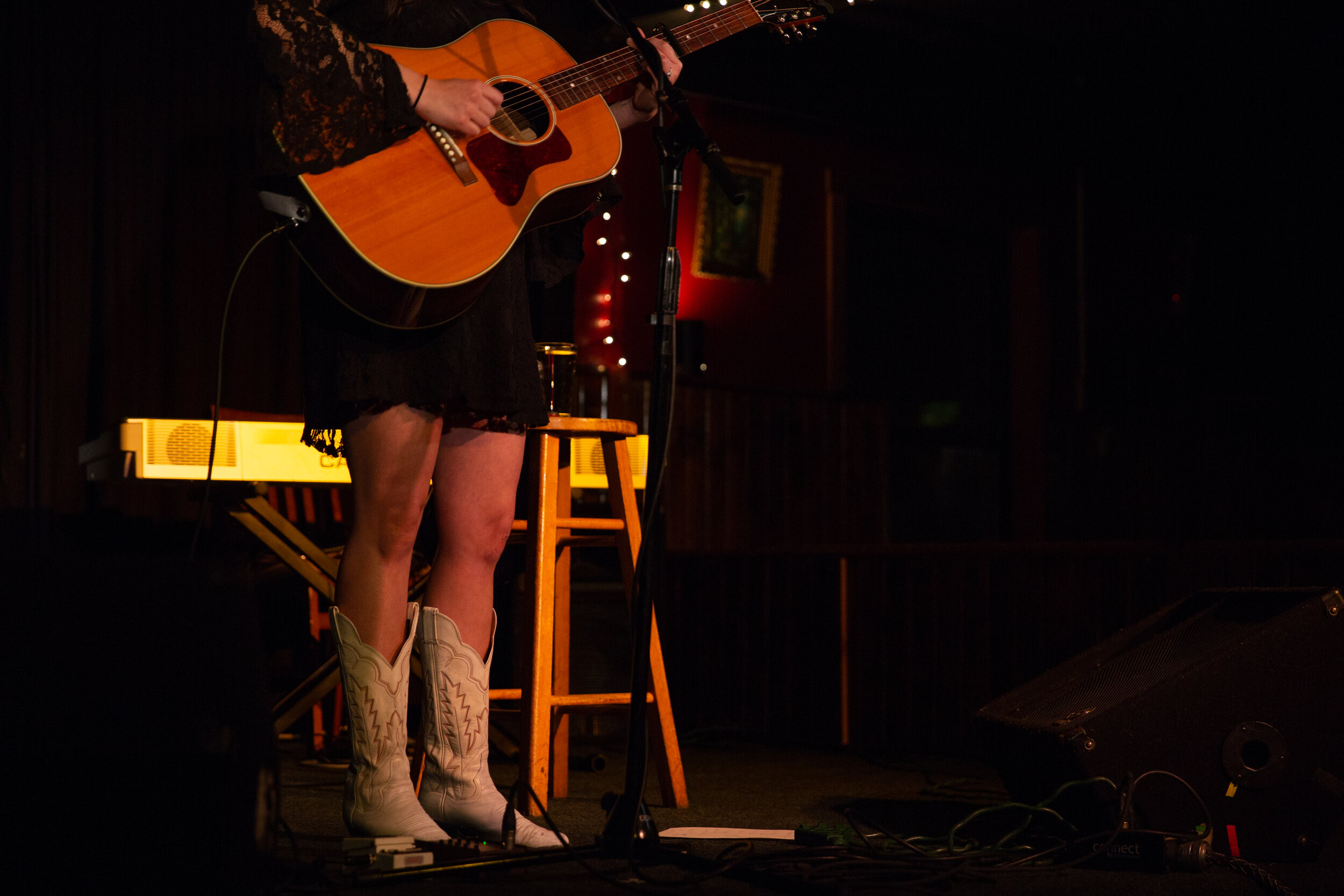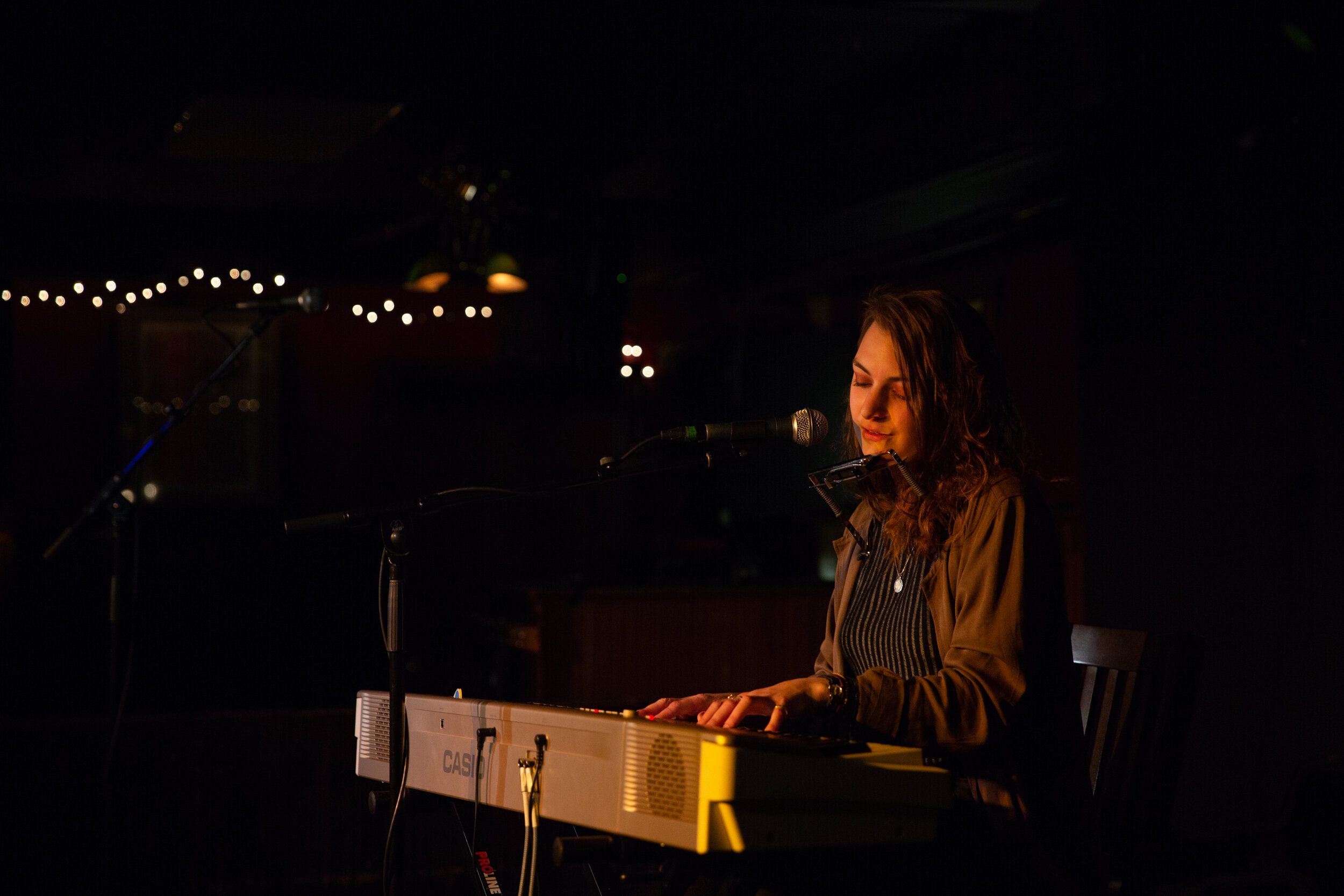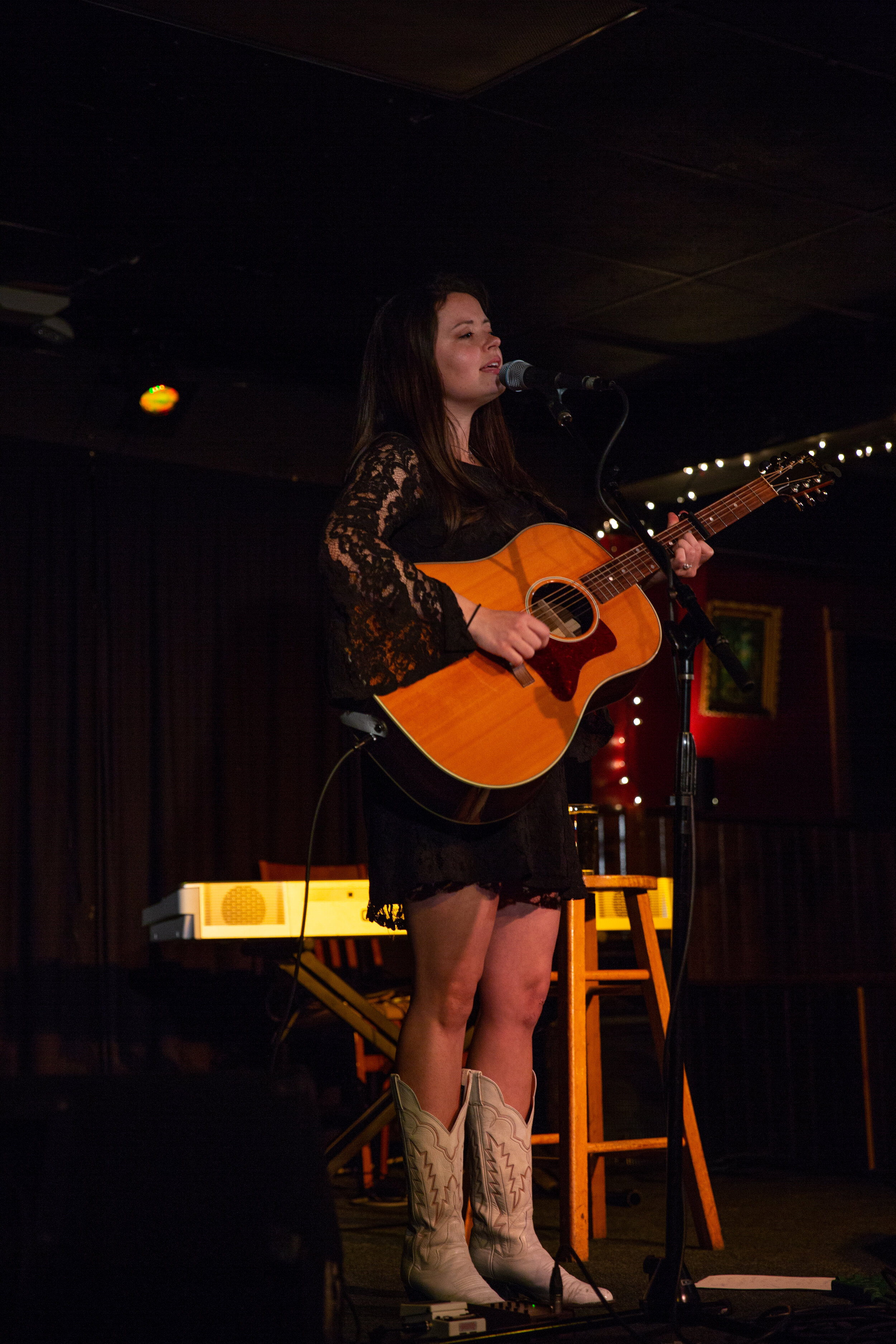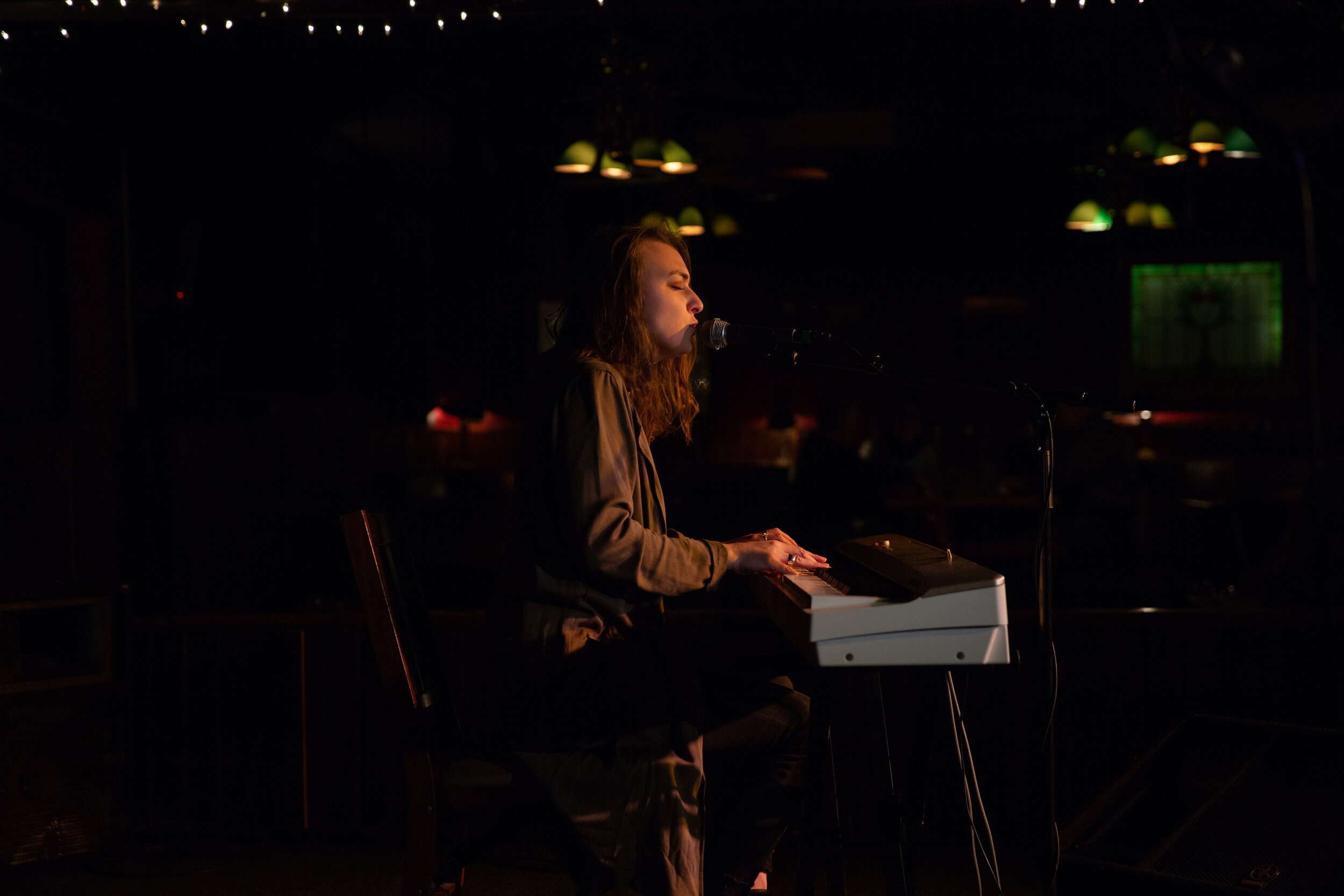Milling about a Dream with Lily DeTaeye and Emily Scott Robinson
by Nichole Shaw
Photos by Vivian Le
I mill about, surveying the 40 people who have inhabited this concert space tonight while the ceiling fans sit stagnant in their emerald green glory. Their lights illuminate the venue, giving me a concrete view of the crowd that’s crawled out of their homes and offices on Super Tuesday night to kick back and enjoy a show featuring two strong women—Lily DeTaeye and Emily Scott Robinson.
As the lights dim, the classic Christmas lights strung up around the stage elicit a warmth, inviting the audience further into the intimacy of this show. It’s as though we’re all sitting in on an artist jam session, one where it’s just the band and family members who have the privilege of being let into the creative space and process.
Lily DeTaeye
Vivian Le for Fools Magazine.
DeTaeye opened the show, and instead of an artist introduction, she sat right down and played “Shoulda Known Better.” She was comfortable in her element, prepared her own set and checked her own equipment with her one-woman show.
A Des Moines native, DeTaeye is familiar with the Iowa City scene. A recent University of Iowa graduate, it felt as though she was coming home because of her bond with our big small town. With DeTaeye, it was like welcoming a family member back, one who you only see on holidays as a treat and always look forward to.
“It’s good to be back in Iowa City,” DeTaeye said.
Throughout the show she multitasked her way through her performance, playing the harmonica and piano or the harmonica and guitar simultaneously. However, a special performance of her most recent single “Hurt You” was stripped down to her strong, unwavering voice and simple piano key chord progression. The audience was taken not by an elaborate intermixing of instrumental excellence, but rather by the power of DeTaeye’s lyrics and demeanor, hunched over with rounded shoulders as if she was protecting herself from the world around her.
Lily DeTaeye and a member of the audience
Vivian Le for Fools Magazine.
Her next song, “Sweet Tooth,” took on a drastically different approach, inviting audience member John up to jam out on the piano keys with her. Explaining that this was a song she intended for audience interaction. The experience devolves into something you’d expect to see in the basement of a friend’s house—a friend jumps up to jam out with their talented friend who plays gigs, headbanging as the vibe surmounts into something indescribable, a feeling shared only with those in the room that have the privilege of witnessing the birth of a musical relationship.
In transitioning to her next songs, it is clear that DeTaeye is a member of this audience in congruence with her position as a performer. She is us, and we are her.
“I’m a woman—everyone’s like woah (who could’ve guessed that),” DeTaeye said. “It’s not great for women right now; it could be better. And so, I wrote this song, when I was feeling particularly mad about it,” she said, referring to “Father’s Daughter.”
DeTaeye is a singer and songwriter who is not afraid to bring contentious points into the spotlight, telling stories about sexual assault, sexism, mental health struggles, the ignorance of unsustainability and hunting, among other things. She tells them through the art of folk, soft rock, blues, and a twinge of jazz.
The following words are taken from DeTaeye’s mouth and formatted in my engagement with her performance:
I’m just my father’s daughter
his eyes are in my head.
I’m just my lover’s lover
my place is in his bed.
If you don’t want to think of me, you can think of him instead.
I know you’ve heard it all before.
It’s been too hard. Too much to
even out the score, put down the
victim card.
It was a touching performance, one where the audience had the privilege to see what some might perceive as political as truly human. She sang to us, rather than at us, reaching out and gripping us in a vicelike commitment to make us see the pain that she and so many other women have endured during this administration and the various high-profile trials that have ensued during the #MeToo Movement.
That performance was closely entwined with “Tusk,” a song with a newly released music video. The song was created as a response to the United States’ repeal of an Obama-era trophy ban, allowing Americans to bring elephant tusks back as trophies. The performance was riveting as DeTaeye gripped at her hair and grasped at air, looking for security and safety that was taken from her and the subjects of her songs.
Emily Scott Robinson
Vivian Le for Fools Magazine.
As she ended her set, I became completely captivated by the older couple that sat in front of me. Their hands were clasped tightly over the table, and they made eye contact whenever DeTaeye hit a note just right. It was something the couple carried over to headliner Emily Scott Robinson’s set, especially when she sang about love and its trials and tribulations.
Robinson took the stage next, commanding a southern belle energy with a hint of rebellious aphorism. She wore a black dress with lace sleeves and striking white cowboy boots, staying true to her North Carolina roots.
Despite her striking white boots, Robinson appeared reserved and humble as she spoke in a soft and mellow cadence between songs. When she did sing however, she absolutely captivated the audience. For that first song, “Ricochet Lies,” everyone seated in the dimly lit restaurant of The Mill stopped what they were doing and put down their food, entranced by Robinson’s presence and voice.
Her voice was one that never faltered, staying sweet and angelic as it transcended into the quintessential Americana voice. It felt familiar—like you were driving down a highway road through the Midwest by yourself when the only radio stations are classic country.
She has a traveling spirit, one that isn’t consumed by social media like Twitter, which Robinson boldly called trash. She’s more concerned with her presence in life as she travels the country with her husband in a tricked-out RV, traveling west and back.
Her second song was one of my favorites called “Slaughterhouse Road.” It was written in response to seeing a newspaper headline about a sheriff who was found dead on Slaughterhouse Road. It was also a crowd favorite as the audience laughed at the clever lyrics of, “And it looked just like an accident/Final cause of death/Not Miller Lite with cyanide/Just cardiac arrest/Not Miller Lite with cyanide/Just cardiac arrest—Rest in peace honey!”
A lot of her songs are about murder, heartbreak, and the catharsis of both. In a twist to her typical approach in songwriting, Robinson introduced her song “Magnolia Queen,” which tackles the moral culture of beauty as currency for young girls. When she was in high school, she entered into a beauty pageant to win a scholarship for college and came out with trauma she has mostly blacked out. During this performance, the audience was completely immersed into the Southern culture of beauty pageants, reminiscent of what the Netflix movie Dumplin’ showed viewers in the culture of debutante balls and archaic expectations of young women and girls to ascribe to unattainable standards.
Throughout the night, I was struck by how much of a storyteller Robinson is through song as she carved out storylines and strummed us along scenes in Chattanooga, Tennessee and Greensboro, North Carolina. There was no rush to move along the set, nor in Robinson herself. This came across to me in her performance of “Westward Bound” from her 2019 album Traveling Mercies.
“There’s something pretty magical about going west,” Robinson said.
Emily Scott Robinson
Vivian Le for Fools Magazine.
Not afraid of silence, Robinson’s transitions were often only slow tales of her travels through the country with her husband, followed by the tuning of her guitar. This lifelong journey in her 30s as she’s touring the United States is also a journey of self-discovery and the growth of relationships along the way.
“You’re almost always a guest in someone else’s home,” Robinson said.
Borrowed rooms and old wood floors.
I live in other people’s homes.
They make a year that's like the one before
You're still a ghost in every town
Gotta get lost if you wanna get found.
—Robinson, Ghost in Every Town
When she sang the love song she wrote for her husband Rous, “Better With Time,” as an audience member I felt as though I was intruding on the special, intimate story of their marriage. She sang directly to him with a smile just for him and him only as he smiled down at the ground, splitting across his face as he swayed on his stool.
The older couple in front of me mirrored this beautiful exhibition, as they connected with each other, separated only by the restaurant table. They saddled up close and stared into each other’s eyes, gripping the other’s hand a little tighter when Robinson sang, “Oh, the memories are sweet, but I wouldn’t trade 'em for/The way we fight a little less now, make love a little more/Like that bottle we've been saving of California wine/We keep getting better with time.”
A storyteller at heart, Robinson has mastered not just the telling of her own stories, but the sharing of others in a transparent, authentic, and respectful way—a skill I applaud her for as I struggle to do it every time I put pen to paper and finger to keypad.
“If we don’t study history and we don’t keep these stories alive
if we don’t keep this memory alive
of what that sacrifice meant
then we are at risk of repeating the same mistakes
the same things that led us into
losing so many
young people.
We’re doomed to
repeat history
if we don’t remember
these stories and these perspectives on the world and on life,”
Robinson said.
Robinson told the story of a WWII veteran she knew in her song, “Overalls.” It was tastefully done as she translated the wishes of this veteran to be buried in his overalls, a pack of Marlboro Reds, and his lighter. A celebrator of life and all it has to offer, Robinson brought us into an experience that wasn’t ours to share but to learn from, encouraging us to reevaluate our positionality and life perspective.
She moved on to another one of my favorites of the night, “Run.” It chronicled the story of a woman who was a victim and survivor of domestic violence. Robinson’s old day job was a social worker before she switched full-time to music. She worked exclusively with victims of domestic violence and sexual assault in her innate yearning to help people. It opened her eyes to the darkness of the world, while simultaneously showing her the incredible resilience of survivors.
It was an extremely emotional song, one that I teared up at, as she told this story, bringing us along the journey of a woman who is fighting for a chance to live when she has a husband who reaches for his gun as he comes home blasted a quarter to one.
First time he ever hit me
I covered up the bruise
He's the kind of thunderstorm
That takes all day to brew
I could hear him in the kitchen
Take the safety off the gun
Saw a shadow in the hallway
Somethin' whispered "Run"
I never even gave
The sun a chance to rise
I left the bed unmade
I didn't say goodbye
I left him in the dark
A hundred miles away
I'm the only pair of headlights
On the interstate
Today's our anniversary
Eleven years I stayed
And I can see the longest night
Is breaking into day
As Robinson sang, she gave space for her words to hit the audience, allowing brief silences to fill the venue as we ached for this woman. Robinson reminded me of the power of storytelling. It reminded me why I do what I do as a writer. I tell the stories of those who go unheard and voiceless into the night. It’s my responsibility to share those stories in order to encourage the public to not only empathize with them, but connect with them in a collective effort to understand each other so we can work together as human beings and make this world just a little better day by day, chord by chord, word by word.
Emily Scott Robinson
Vivian Le for Fools Magazine.


